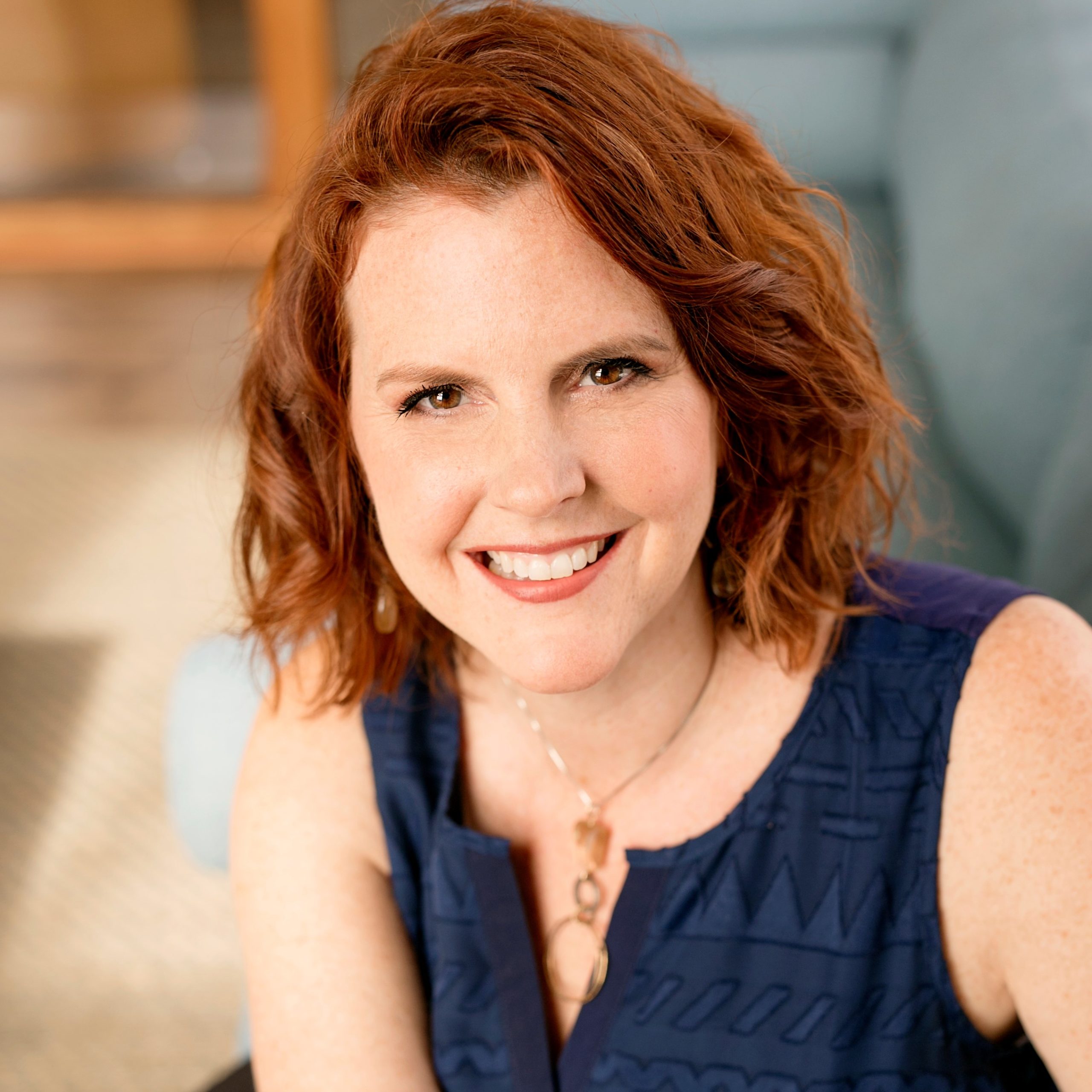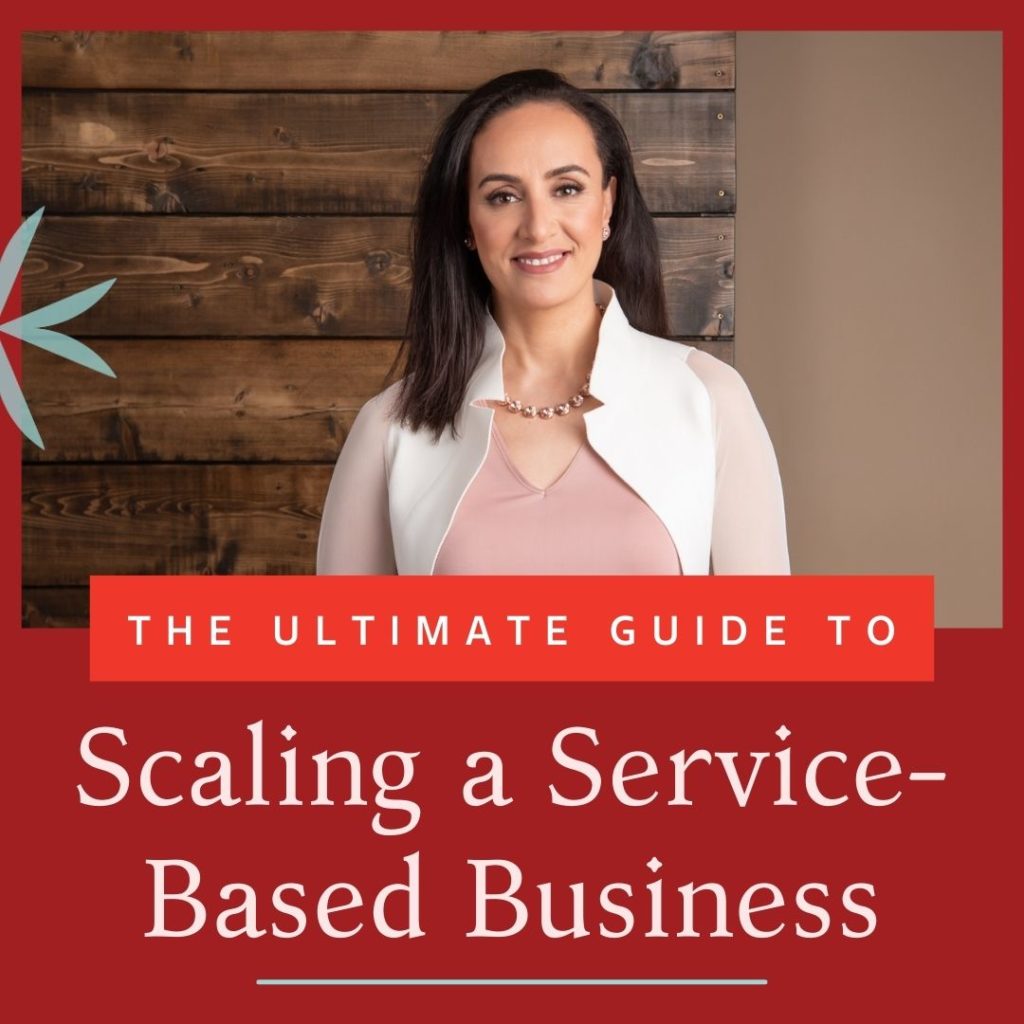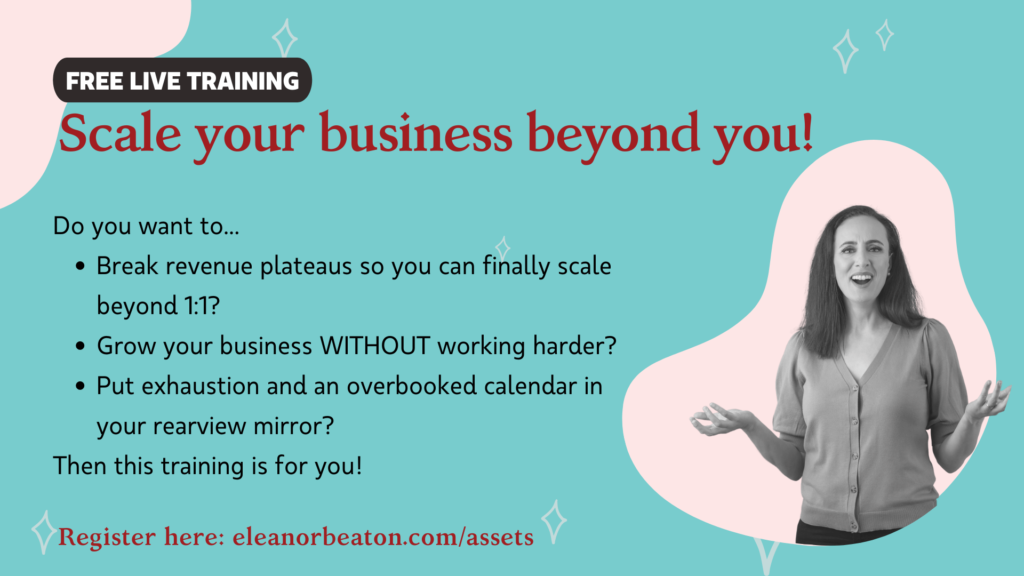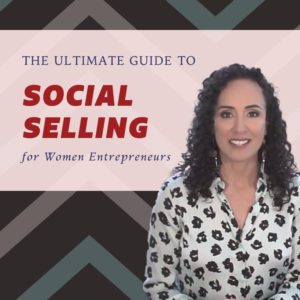How to Move Beyond 1:1 Without Alienating Your Clients, Compromising Service Delivery, or Damaging Your Brand
After a decade of interviewing CEOs, working with women entrepreneurs, and building my own 7-figure business, I can say with certainty that there’s a deeper reason you started your service-based business: to make money and a difference in the communities you serve. Most business models overlook this aspect, because most business models are developed by—and for—men. But through thousands of conversations with women entrepreneurs, I’ve come to understand that most of us want the same three things: cash, influence, and autonomy. We want businesses that give us freedom and flexibility, the facility to effect real change, and fat stacks of cash.
This, my friends, is the Jewel Business Model, a model I developed that brings together everything that we as women entrepreneurs really want from our businesses: profitability and economic growth as well as the ability to make an impact and free up our schedules. Entrepreneurs who use this model, like many of my clients, have the opportunity to achieve total life success.
To learn more about what a jewel business is and is not, listen to episode 444 of the Power + Presence + Position podcast, “What is a Jewel Business?”
Total life success doesn’t just happen. It requires time and energy, and focused strategies that allow you to scale your business beyond a 1:1 service delivery model. When you’re the only asset in your company, it’s easy to get caught in the delivery trap; to work harder—not necessarily smarter—in a seemingly endless cycle of sell, do, sell, do. As a result, many women entrepreneurs wind up overworked, overwhelmed, overscheduled, and sometimes even wanting to throw in the towel. I’m here to tell you it doesn’t have to be that way. It’s totally possible to build your business based on your assets, not your hustle.
In this ultimate guide, I’ll cover everything you need to know about how to scale your service-based business without compromising your client base or your brand, including:
- How to simplify and build trust in the systems you create
- Two types of systems you can create and scale in your service-based business
- How to establish your expertise and build authority in your industry
- How to scale successfully with group programs
- Common mistakes to avoid when scaling your business
Let’s get started.
Why women’s success is important to the global economy
How does scaling a service-based business impact world economic development? I’m glad you asked. In Canada, research shows that enabling more women to become entrepreneurs could add $150 billion in incremental GDP by 2026. Their success means more jobs (since SMEs employ 9 out of 10 Canadians in the private sector) and more municipal taxes to improve local communities. It also keeps our country competitive on the global stage. Bottom line: when women entrepreneurs run thriving businesses that enable them to have autonomy and to make an impact, we all win.
In the past 7 years, the global rate of women’s entrepreneurship has increased significantly with more than 163 million women around the world starting businesses. I want to see this number continue to grow. As a business advisor, I’m on a mission to double the number of women entrepreneurs who generate over $1 million per year in annual revenue by 2030 through world-class education, events, resources, and coaching.
In the past 7 years, the global rate of women’s entrepreneurship has increased significantly with more than 163 million women around the world starting businesses.
Learn more about my work to empower women entrepreneurs at safi-media.com
What ACTUALLY HAPPENS when you scale beyond 1:1
Before I talk about how to scale your service-based business, I want to clear up a common misconception: scale is not the same as growth. At its core, scaling sets you free, while growth creates more problems.
Growth in revenue means higher operational costs, since you need more team members and resources to do the actual work. Without a thoughtful strategy, it often results in growing complexity—and headaches—as well. Scale, on the other hand, happens when your revenues grow faster than your expenses, resulting in positive cash flow, freedom, and flexibility. The key differentiator is intentional design.
Learn more about the difference between growth and scaling on the Power + Presence + Position podcast, “Growth Versus Scaling and Why It Matters”.
When you sell with a 1:1 delivery model as a service provider or solopreneur, you are selling you—your reputation, credibility, and ability to deliver exceptional work. The more contracts you close successfully, the more trust you build in yourself and your skills. When you scale beyond 1:1, you make an important shift from selling you to selling your system. Buyers now have to transfer their trust from you personally to your system. That’s the part so many entrepreneurs miss.
As you develop your strategy and system to scale, it’s critical to set yourself up as an expert in your industry and build authority. More on that to come.
What does selling a system actually mean?
A system is an organized framework or method that you create to simplify and scale your work, without the entrepreneurial overwhelm that can come from 1:1 delivery models. For service-based businesses, there are two types of systems you can create:
Knowledge Systems
Knowledge systems are frameworks you establish to share your knowledge and expertise with a wide group of people. Think group coaching or learning programs.
Service Delivery Systems
Service delivery systems require hiring and training people to do the work that you do. This means putting the resources and infrastructure in place to be able to take a step back yourself.
You could choose one or blend of both, which is what we do at Safi Media. In either case, keep in mind that what you’re actually selling is the solution to your customers’ problems. You’re helping them overcome a pain point by moving from their current situation (point A) to an improved situation (point B). So make sure this before-and-after transition is explicit in your marketing materials.
Learning how to turn your knowledge into a system is one of the most important skills you need to scale your business beyond 1:1. Join our upcoming training to learn how to develop assets to grow your business faster and more sustainably.
Establish your expertise with a strong content marketing strategy
Speaking of marketing materials, let’s take a moment to talk about content marketing. Having a strong content marketing strategy is a great way to increase the visibility, authenticity, and credibility of your business. Start by understanding your target audience and answering the questions they’re asking about your industry. Create and leverage high-value content like podcasts, blogs, or email newsletters to position yourself as an expert and build up “excess” credibility you can “lend” to your system.
Let me demonstrate. Years ago, I was certified in coaching by Dr. Martha Beck, a Harvard-educated social scientist, bestselling author, and veteran life coach. Dr. Beck had so much credibility built up from her books and television appearances that she could easily “lend” to her trained facilitators. I felt like I didn’t need to learn from her 1:1 (and I didn’t expect to). I was happy to work with her team. If Dr. Beck had vetted them, that was good enough for me!
For more on how content can help you establish your expertise, check out my Ultimate Guide to Social Selling for Women Entrepreneurs
Build authority by going ALL IN on ONE THING
Niching is the act of focusing your offer on a specific group of people. It’s something I talk about a lot (like in this episode of Power + Presence + Position), since a strong niche can bring more focus to your business and build your reputation as a specialist in your field. Start by thinking about who you want to help, specifically, and targeting your offer towards them. In the same way you “lend” credibility, you can also “lend” authority to your team or group coaching or learning problem.
For example, you might decide to niche down from general life coaching to helping women be more successful in their careers by reducing their alcohol intake. Suddenly, you’re a specialist.
To learn more about how niching down can help build authority, check out my Ultimate Guide to Personal Branding for Women Entrepreneurs.

How to scale your service-based business with group programs
As I mentioned, group coaching or learning programs are a great way to scale your service-based business. By establishing the framework to share your knowledge and expertise with a wide group of people, you can increase revenue, impact millions of lives and free your schedule.
Scaling a Service-Based Business in Action: Stacy Mayer
 Stacy Mayer is a member of The Incubator. She coaches corporate women to get promoted into senior-level executive positions, and she’s on a mission to get one thousand powerhouse corporate women promoted every single year worldwide.
Stacy Mayer is a member of The Incubator. She coaches corporate women to get promoted into senior-level executive positions, and she’s on a mission to get one thousand powerhouse corporate women promoted every single year worldwide.
Stacy’s excitement for her work is palpable (just listen to her describe it in this episode of Power + Presence + Position!). It would have been easy for Stacy to reach those thousand women through group programs, but she practiced constraint and spent a good chunk of time realizing and refining her messaging knowing that the payoff would be worth it in the end.
“Because my messaging was so clear, my sales calls were super clear,” she says. “When [potential clients] would get on the phone with me, they would feel the energy of a year and a half of refinement. They would feel the energy of all the articles, all the podcast episodes, everything I did that was based on my mission.”
That energy—the level of excitement and enthusiasm—Stacy brought to every sales call is essential to scaling with group programs. It’s magnetic. And it’s an important step in making the mindset shift to move beyond a 1:1 delivery model. Your enthusiasm for your group program must be greater than your fear in making the offer. So, get clear on what you love about your work and share that energy with everyone, and everywhere.
“I repeated my message all the time. On every Facebook Live, every LinkedIn live, everything I was doing,” says Stacy, who admits that eventually, “I realized that the messaging I had been working on all year was the program. I had a program already written!”
Stacy’s story is a masterclass in scaling strategically. By focusing her niche, refining her messaging, and cultivating a growth mindset, she has found massive success implementing group programs over the last six months.
With these tips, you can successfully build group programs into your business strategy to:
- Build awareness of your offer: Once you’ve nailed down your program, start talking about it everywhere. Share it on your website, social media channels, and marketing materials.
- Position and sell your group programs as a bonus to your 1:1 coaching: This helps potential clients understand the benefits of working with you, because your messaging and methodology is already clear.
- Use pricing to make your group program a no-brainer: By raising the price of your 1:1 delivery model, you can justify the price of a group coaching or learning program.
- Rewire your mind to accept the power of group programs: Understand that women thrive in well-designed, thoughtfully-moderated communities.
- Be the type of client you want to attract: Be humble, but not modest. Ego is dangerous and it can get in the way of developing group programs that are true delicacies.
- Be open to growth: Know how big you will allow yourself to be.
For more advice on how to build and sell group programs, check out episode 448 of Power + Presence + Position, “How to Convince Your 1:1 Clients to Buy Your Group Programs”.
How to scale your service-based business with team
Another way to scale your service-based business so you can generate revenue without working around the clock is by hiring and training people to do the work that you do. I’m not talking about assistants or interns, but professionals who you have personally vetted. Learning how to integrate these team members is important. But convincing your clients to work with them, rather than you, is critical.
Here are three big mistakes that will prevent your 1:1 clients from working with your team members—and how to avoid them:
- You haven’t elevated your significance and contribution level beyond 1:1, so your clients can’t either: As you grow, you need to fill your emotional cup and get your sense of significance and contribution from something more than selling 1:1. If you don’t, you’ll continue to insert yourself, frustrate your team members and hold your company back from scaling. Shift your focus from what you do to what you create.
- You don’t have a system or methodology: If you want to scale beyond you and your skills, you need to sell a system or methodology that you’ve created. If you don’t, you’ll put enormous pressure on yourself to continue re-inventing the wheel. Turn your ideas into assets by training others to do what you do.
- You haven’t built sufficient authority: You need to create enough trust and goodwill in the market to transfer it to others. If you don’t, you’ll be called upon constantly and experience burnout, fatigue, and loss of motivation. Build authority by using your content to establish your expertise in the industry and provide value to your clients.
For more on how to make the tactical changes to get on the path to 7-figure growth, check out episode 449 of Power + Presence + Position, “Mistakes That Will Prevent Your Clients From Working With Your Team”.
Move beyond 1:1 without compromising your client base or your brand
In this guide, I’ve given you actionable strategies to stop overworking yourself, simplify your systems, and scale with confidence. Scaling your service-based business takes focus, determination, and purpose—but in the end, you’ll achieve total life success.
As a premier business coach, I’ve helped countless women entrepreneurs scale their service-based businesses past the 7-figure mark with powerful positioning, messaging, and sales funnels. Learn how to scale your company beyond you by creating 7-figure assets.


